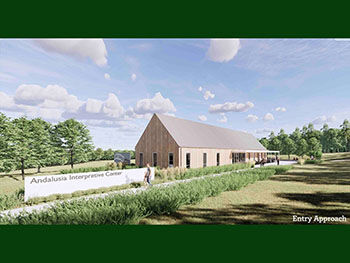Image


Andalusia Farms was home to Flannery O'Connor, one of the 20th century's most celebrated writers, and now Andalusia is the home of America's newest National Historic Landmark.
Also, sort of as a cool side note, Andalusia gives the state of Georgia exactly 50 National Historic Landmarks. Two of those are here in Milledgeville – the Old Governor's Mansion and now Andalusia.
The announcement comes at a time when Andalusia already had plenty of momentum, thanks in large part to Georgia College, which acquired and took over the property in 2017. The university announced last summer that it was using its expansive network of resources and funding sources to construct a brand-new, $3.4 million "Interpretive Center" at the old farm property, which is located on North Columbia Street and roughly a quarter-mile north of Walmart.
The Interpretive Center will change the landscape and dynamic of Andalusia relatively dramatically. Among the amenities on the inside will be "an exhibition room, a research area, a gift shop, offices and rental facilities. Outside, meanwhile, there "will be a story-telling courtyard and walkway connecting to the rest of the property."

Here is the university's latest press release in its entirety:
Georgia College celebrates its second National Historic Landmark (NHL)—Andalusia Farm in Milledgeville, Georgia—home of American famed Author Mary “Flannery” O’Connor, ’45, a designation just announced this week by the National Park Service. Georgia’s Old Governor’s Mansion was the campus’ first NHL, receiving this recognition in 1973. This designation has been awarded to a small number of campuses in the U.S., and is carried by less than three percent of America’s historic sites.
“There are campuses across the country that have National Historic Landmarks, but this is a rarity in Georgia to have two in a town of our size and capacity,” said Matt Davis, director of Historic Museums at Georgia College. “It’s an accomplishment we can all be very proud of.”
O’Connor and her family moved to Milledgeville when she was 15 years old. Within a year of moving from Savannah to her new home, O’Connor lost her father to systemic lupus erythematosus
She graduated from Peabody High School in Milledgeville in 1942, and enrolled thereafter in Georgia State College for Women (GSCW), now known as Georgia College. O’Connor was the art director and cartoonist of Georgia College’s school newspaper—the Colonnade. One year after she graduated from GSCW, O’Connor participated in the Iowa Writers’ Workshop and later studied journalism at the University of Iowa. From 1946 to 1964, she was a novelist, essayist and short-story writer. She also wrote journals and letters, as well as conducted some notable interviews.
In 1950, O’Connor would be stricken with lupus, which resulted in her moving back to Milledgeville to reside with her mother at Andalusia. From 1951 until her death in 1964, O’Connor would complete the bulk of her work, which ultimately totaled two novels, 32 short stories and over 100 literary critiques. Many of the personalities and environs in and around Andalusia would serve as the inspiration for the places or characters within her works.
The farm remained in the O’Connor family from 1964 until 2003 when it was given to a private foundation for use as a museum. In August 2017, the site was gifted to O’Connor’s alma mater, Georgia College.
Andalusia is open for public tours and became listed on the National Register of Historic Places in 1980. In 2019, it was named a “Distinctive Destination” by the National Trust for Historic Preservation.
After more than 12 years of preparation work, the initial step toward Andalusia becoming a National Historic Landmark took place Sept. 2, 2020, when Georgia College addressed the National Historic Landmark Advisory Committee.
““It’s so important that the places we deem nationally significant represent the diversity of the American experience. O’Connor’s contributions represent a unique space in American literature, and her works continue to inspire new generations.”– Chuck Sams, director of the National Park Service”
“We had up to 30 minutes to state our case,” said Davis. “Representatives from the National Park Service, Dr. Evelyn Causey, who worked with the former foundation to submit the nomination form, and I were allowed to present on the historical significance of the site. Based on the unanimous vote of the committee to approve our nomination, I think everyone agreed that Andalusia was worthy of this designation.”
Following the National Historic Landmarks Committee’s approval, the consideration of Andalusia Farm as a National Historic Landmark (NHL) went before the National Park System Advisory Board on Sept. 17, 2020, for consideration and approval. The Board recommended the designation of Andalusia Farm as an NHL. It was then sent to the U.S. Secretary of the Interior, who designated it as an NHL on Jan. 27, 2022.
“It’s so important that the places we deem nationally significant represent the diversity of the American experience,” said National Park Service Director Chuck Sams. “O’Connor’s contributions represent a unique space in American literature, and her works continue to inspire new generations.”
Davis recognizes the staff and the board of trustees of the previous Andalusia Foundation, who did much of the initial work on this.
“We appreciate the family of Flannery O’Connor, because they were very instrumental in working on that process, as well,” Davis said. “I also recognize my current staff, who’ve helped complete this process.”
O’Connor’s home serves as a reminder of who she was and the lives she touched with her writing.
“We are so pleased that Flannery O’Connor’s home has gained national attention through this distinction,” said Cathy Cox, president of Georgia College. “A notable figure in the literary world, her creative works continue to impact many of our students and aspiring authors throughout the world. We are honored to be able to preserve this pivotal part of Flannery’s legacy here at Georgia College.”